Piolets d'Or Announces the "Significant Ascents" of 2023
This list of 68 climbs is effectively a "long list" used to select nominees of the prestigious alpine award.
Tony Riddle has his sights set on an 874-mile barefoot ultra-run across Great Britain to inspire us all to reconnect to our natural human capabilities.

Tony Riddle is a rebel with a cause. Working as natural lifestyle coach based in London, Tony's perspective is superimposed on the acute intention to live this very moment in gratitude, and his overarching commitment to run 874 miles across the UK in order to raise awareness for sustainable environmental practices.
[buzzsprout episode='1834102' player='true']
Tony believes that inside all of us lives a tree climbing, wild swimming, bush-crafting beast, and he will be testing the beast within on his 874-mile barefoot run traversing the whole length of the island of Great Britain. During the entire month of September, Tony will run 30 miles per day from Land’s End, at the southern cliffs of England, to John o‘Groats, the northernmost village on the Scottish mainland. Tony will interview experts along the run to raise awareness for environmental sustainability. As an incredible example of human physicality, Tony hopes to influence his growing tribe on the benefits of barefoot running, ancestral movement, and the importance of re-aligning ourselves with nature for emotional, social, spiritual, and physical health.
https://www.youtube.com/watch?v=YqrfMkrLWTY
Tony provides individualized coaching as well as group workshops and retreats to encourage people to abandon today’s sedentary sitting culture and regain the full arsenal of movement that our hunter-gatherer ancestors utilized to survive. Previously in our REWILD series, The Outdoor Journal discussed Tony's search for practices to make us more in tune with our natural human physiology, how we internalize behavior from our “tribe of influence” and how we can all lead a more natural lifestyle that is aligned with our DNA.
In this installment, Tony to discusses his motivation for running barefoot across the island of Great Britain, daily practices for building the body into a “superstructure,” how he moved past childhood trauma and stepped into his power, and how we can all lead a more natural lifestyle.
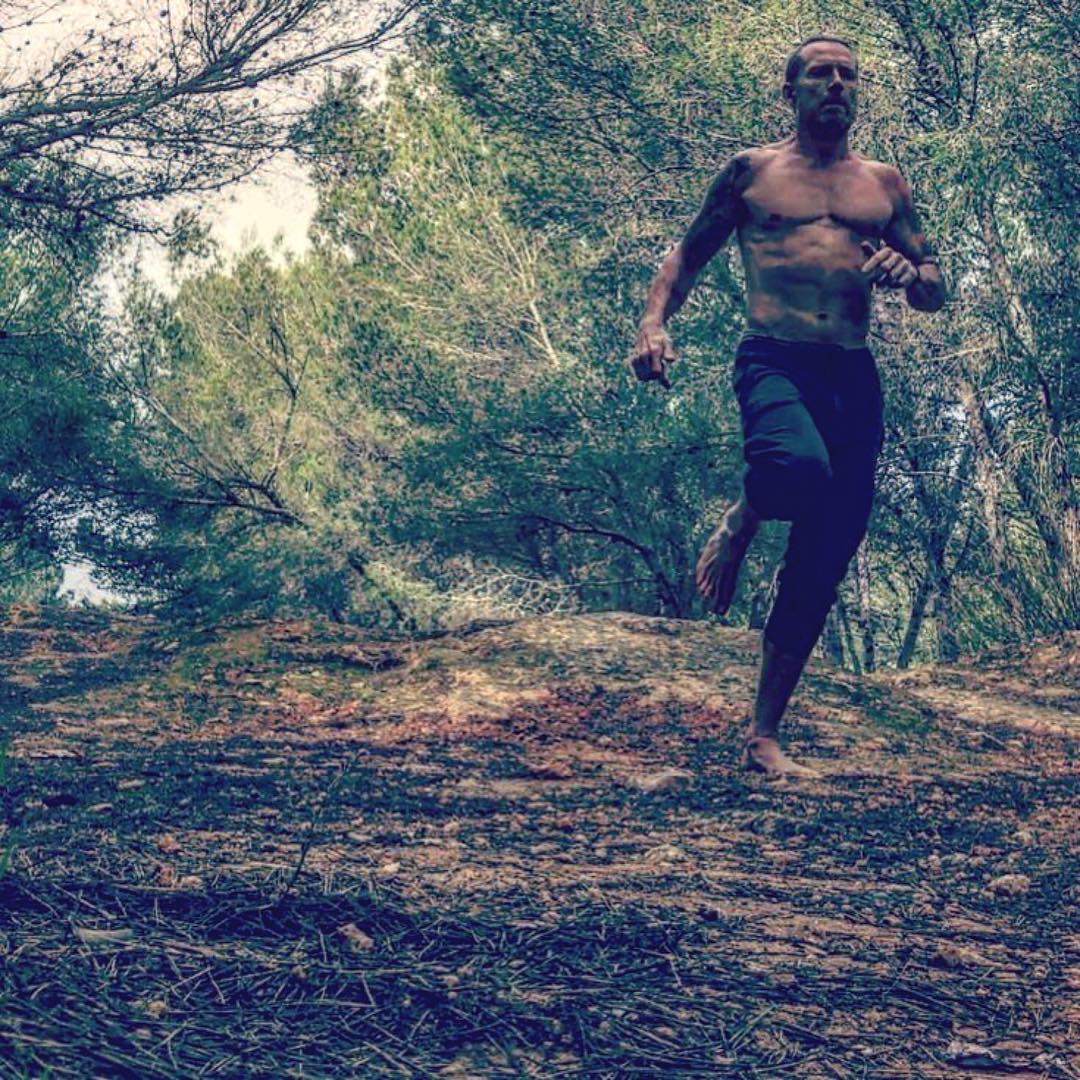
TOJ: When it comes to preparing for the barefoot running challenge, you would think that most people who are training for a month of ultra-marathons start out by steadily increasing their mileage. But you're starting out with building your body into a “superstructure.” What does that mean?”
Tony Riddle: I should be able to just get up every day and run for miles. We are sapiens. That's what we did. If you look at the Tarahumara in Copper Canyon, Mexico, those guys are smashing out 430 miles in 48 hours. They're doing 16 marathons back to back. So that's in our DNA. They're not like a bunch of aliens that landed here and just suddenly started running that kind of distance. We could all do it. But the fact is, some people even have trouble running for a bus today. I'm not berating them, I’m just saying we've been culturally conditioned, so that's the social norm.
If I'm barefoot running now, I have to first get the foundations of my feet to understand their role. When I'm not running, I have to have a pair of shoes to preserve my feet, a bit like preserving kids feet, so my daily wear is Vivobarefoot, which I work with. I don’t run in their shoes, I live in their shoes. Hunter-gatherers don't wear compromising footwear, take them off and go barefoot running. Running is just the byproduct of my lifestyle.
Is running a cardiovascular exercise or is it a strength and conditioning exercise? When you walk, the ground reaction force is only one times your weight. So when you’re standing or whatever rest position you're in now, your movement brain recognizes one times your body weight. But when you start running, there are two times your body weight in ground reaction forces. When you sprint, there could be three times your body weight in ground reaction forces. But you're doing that on one leg, alternating legs. So you have to balance this structure on one leg whilst dealing with two times your weight. I’m 75 kilos right now, so that's 150 kilos of force on each leg and I'm doing that at 180 beats per minute. So is running a strength and conditioning exercise or a cardiovascular exercise? It's a strength and conditioning exercise!
“I don’t run in their shoes, I live in their shoes.”

Strictly in terms of physiology, I'm going to go out and do more mileage. but how long am I going to be able to go before my physiology breaks down if I don’t focus on technique and if I don’t focus on the mind? If you focus on technique, your physiology gets stronger over time based on the technical model. Then you can do more mileage over time while the mind gets more and more satisfied with the discipline. I have to build the strength to be able to hold that physical framework for the length of time that I have to be out there.
“Running is just the byproduct of my lifestyle.”
I’m working to rewild my posture through ground living. I tend to sit less and rest on the ground more because that's what most barefoot running cultures are doing. Living in "the human zoo," my posture is compromised. So I have to follow the path of the wild beings, and for that, there has to be a strength and conditioning program in place to make my physiology strong enough to be able to hold that technical shape for the time and distance I want to cover on this challenge. Otherwise, I'll be less efficient and I will increase the risk of an injury. That strength conditioning and the technique is about efficiency and minimizing injury because if you're a hunter-gatherer, you can't afford to get injured and you can't afford to burn too much fuel.
TOJ: What do you think is the optimal diet for building the human body into a superstructure?
Tony Riddle: We’re all unique, so I would want everyone to answer this differently. I tried Keto years ago and it was great until it didn't work. The same thing for Paleo, it was great for a bit until it didn’t work. Then I went Vegan, and it worked for a bit. And then I went plant-based. I kept changing until I thought, “What is it that I need? How can I recover better?" I realized through experimenting with different systems the things that aren't enabling me, like grain. So I removed grain and then I went heavy on the plant-based diet and then I started to supplement with wild meat and it was like, “Wow, this is amazing, I feel incredible on this.” I then tested my microbiome. The results showed me which foods to minimize and which foods to have every day.
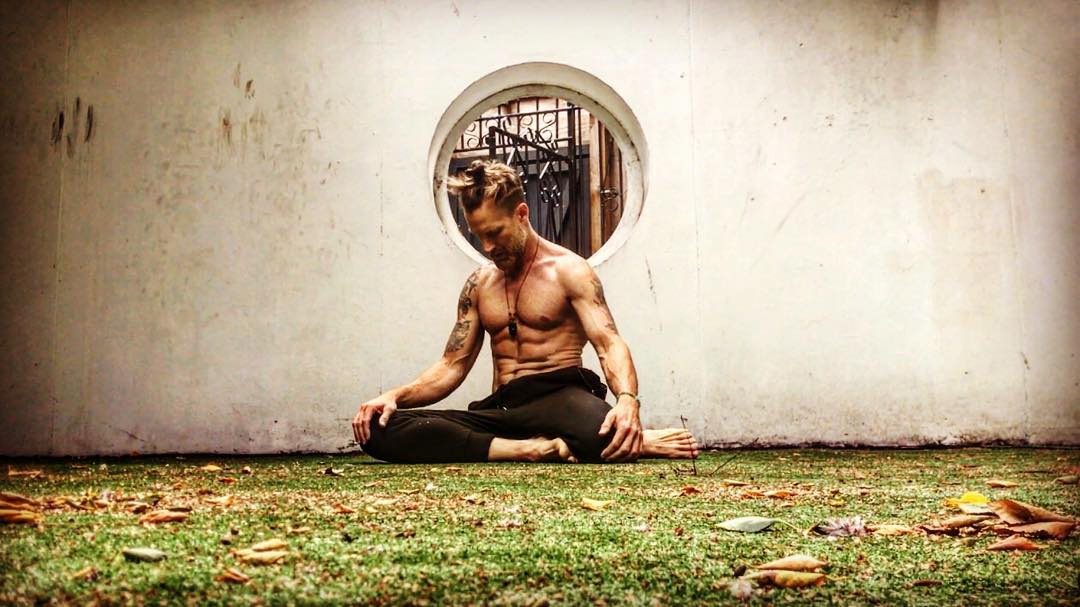
If you keep eating the same stuff, which people do on diets like Keto and Vegan, they tend to favor certain food groups and you've altered the diversity of your gut because you're only feeding certain nutrients to that microbiome. So to get to my own optimal performance, I have to figure out what needs to shift in my microbiome first, then I had to look at what was creating inflammation in my system. So I base things on my cells, my microbiome, and then my dosha. In Ayurvedic work, your dosha might be Vata, Pitta or Kapha. Once you know that, then you know there might be certain foods you're putting in that won’t allow you to recover and perform at your best.

My dosha would be Pitta, which means heat, so the foods with more heat tend to make me more inflamed which affects my performance and recovery. Once I get a map of that, I've learned the best things to eat for me to perform - eating like a Tony. I don’t follow a specific dietary book off a bookshelf because we all need our own individualized book to figure out what we need to perform at the level we want to. The closest I can get to giving universal advice is to just introduce more plants into your diet.
If you are eating meat, what’s going to help you recover, eating domesticated antibiotic grain-fed animals or eating a grazed animal that’s been grass fed to grass slaughter? There’s a biologically normal way of doing that and there’s a biologically extreme way of doing that, which one would you think is going to enable you to perform better? If you're going to eat fish, is it better to eat a wild fish or is it better to eat a farm fish that’s fed on antibiotics? The same goes for the plant kingdom. Is it good to eat monocrop that has been sprayed with pesticides or is it better to choose the full family groups of veggies? There are 80,000 plants out there that you can eat, so rather than just looking at processed foods, go towards natural foods, go towards organic foods because you’re an organic, natural being, and the more you identify with that, the more natural and organic the outcome will be and that then feeds into performance.
The more natural my environment and the more natural the things I put into my body, the more natural the result will be, the more natural the recovery will be, the more natural it will be to wake up the next morning and feel ready to do the same thing. Nature goes in, nature comes out! Whatever you’re doing, ask yourself, “Does that come from nature, or was it made in a laboratory? Has it been abused mentally and physically by the industrial farm?” If you’re going to eat meat, think about how you can support a different system, because that whole industrial farm system is broken. And if you’re plant-based, vegan or vegetarian, get away from monocropping because it’s destroying the planet and the plants are covered in all kinds of stuff that you’re going to be ingesting. By understanding our own unique system, you can learn to eat more intuitively for your own unique body. Go as clean as you can with high vibrational foods and eat no evil.
TOJ: Do you feel a spiritual connection to the route that you chose from Land's End to Joan o’ Groats?
"With my barefoot running challenge, there is also a spiritual connection to the Earth."
Tony Riddle: It's funny you asked that. Yeah, I do. I would have liked to have done Ireland as well, to be honest with you. When I had my 23andMe testing done, it came back that my ancestry through my Y chromosome goes right back to Africa, but then they finally made their way into Scandinavia and then into Scotland, Ireland, and the UK. So my Y chromosome is Niall of the Nine Hostages, which is a group of kings that lived in Scotland and Ireland over however many centuries. Whenever I’ve traveled to Ireland I’ve always thought, “Oh my God, I feel so amazing, I don’t know what it is.” I’ve got a real connection to the UK and I've gone off and done various spiritual ceremonies in the local style. But there’s more than that spiritual connection. With my barefoot running challenge, there is also a spiritual connection to the Earth. There's a spiritual aspect of running. It's a form of meditation for me when I run like that and the more and more I can connect with the earth, the more and more I feel that it's something beyond the physical experience.
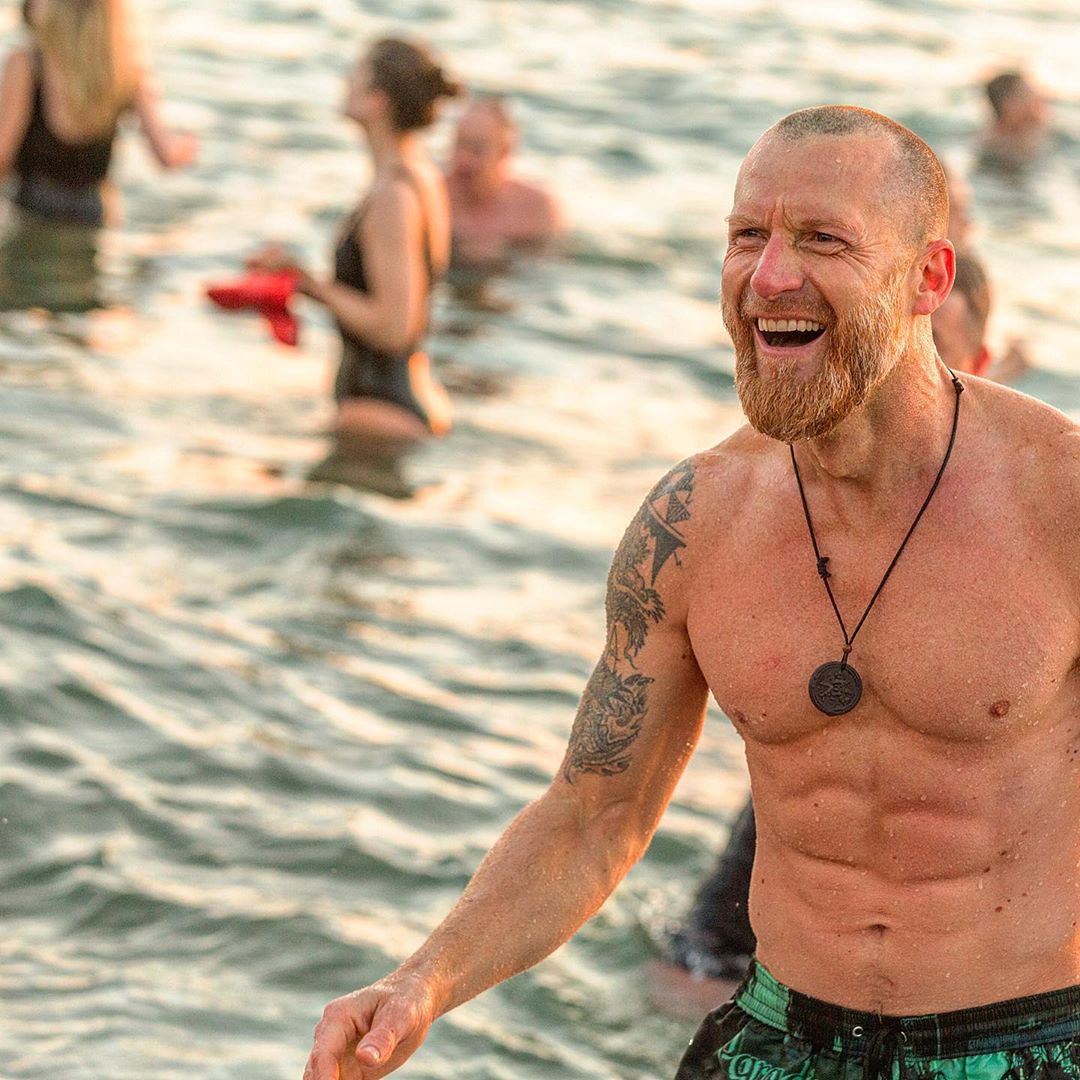
TOJ: When you were a child, your feet needed to be cast and fixed together in a bracing system that sounds more like a medieval torture device than medical therapy. Combined with that story about your past, this 874-mile running challenge reads like a superhero origin story, with a little bit of Forrest Gump in there as well. Do you feel that your traumatic childhood experience impacts you still today?
“That experience literally shaped my whole existence.”
Tony Riddle: It started off like this, I was in a spiritual ceremony and we were in the complete darkness. Suddenly this vision of a pair of boots came up in my mind. My boots from my childhood just suddenly appeared. In that moment, I felt it was a massive insult that my parents had kept these boots, and I couldn’t understand why on Earth they’d want to keep them. It started this journey of me thinking about discussing that memory. Since then I’ve done some thinking about how the initial traumas of life shape us all and the journeys we choose to go on.

Apparently, during the first three years of life, trauma goes right into the reptilian part of the brain. That's where the trauma lies, and that can literally be governing what you do as an adult. So it's no surprise that the practices I do to rewild my feet - and through my work as a barefoot coach, a movement coach, a lifestyle coach - you see it before your very eyes, that experience literally shaped my whole existence.
I could choose to remain negative about being born with crippled feet and being forced to wear boots with a bar connecting them, but where’s that going to get me?
In relation to that trauma, I was also really late to speak as a child. I didn't speak until quite late and my mom never figured it out. She just took me to a specialist because she noticed my sister was talking for me. Later on, as an adult, I went to see this kundalini healer who works with crystals, which all sounds a bit crazy, but the first thing she said when I lied down was, “tell me about your throat.” She asked me to tell her the first thing that came up when I thought about my throat and it was this memory about not being able to speak as a child. Eventually, I fell asleep during the healing, and as I'm coming round, I heard this voice say, “It's your time to speak. We’ve given everything we can possibly give you, you have to step into your power.”
What came up was this trauma. If they're putting these plaster cast boots on you every week, with the metal bar twisting your feet out and you're screaming but no one's listening to you, how long are you going to keep screaming for? So I guess I stopped screaming and therefore I stopped speaking altogether and it took me a while to start speaking. Until I saw the kundalini healer, that was never clear. Since then, it's allowed me to deal with even more trauma.
TOJ: What was your athletic background before you discovered barefoot running and setting this challenge for yourself?
“I used to run even as a kid until I got it in my head that running wasn’t cool, so then I spent a lot of time running away from police instead.”
Tony Riddle: I ran as a kid. I used to run a lot until I got it in my head that running wasn’t cool, so then I spent a lot of time running away from police instead (laughs). Then I joined the army and the army fulfilled the physical box for me and I excelled on things like assault courses, long runs, and boxing. When I left the army, I kind of played around for a bit, wasn't really doing myself any justice. Then I took up personal training and pilates. From there I opened up a 1950’s style boxing gym but expanded it into a whole movement philosophy inside that practice.

It wasn't the smartest business move in the world to start a boxing club that wasn't specifically about boxing, then again, we were well ahead of the game in terms of movement practice coaching. We were years ahead with what we were doing. So what's coming through now with barefoot running and the movement community, we were knocking around with years ago, but it was just wasn't the trend.
TOJ: We're only a couple of months out now, how is training going?
Tony Riddle: In my training, the breathing's been interesting. I'm working on nasal breathing, so I first started taping my mouth up so I can only breathe through the nose and the moment you start to push too much you feel a desire to breathe in and gasp for air through the mouth, that’s how you know you’re going too hard. Then eventually your aerobic threshold grows and grows and grows.
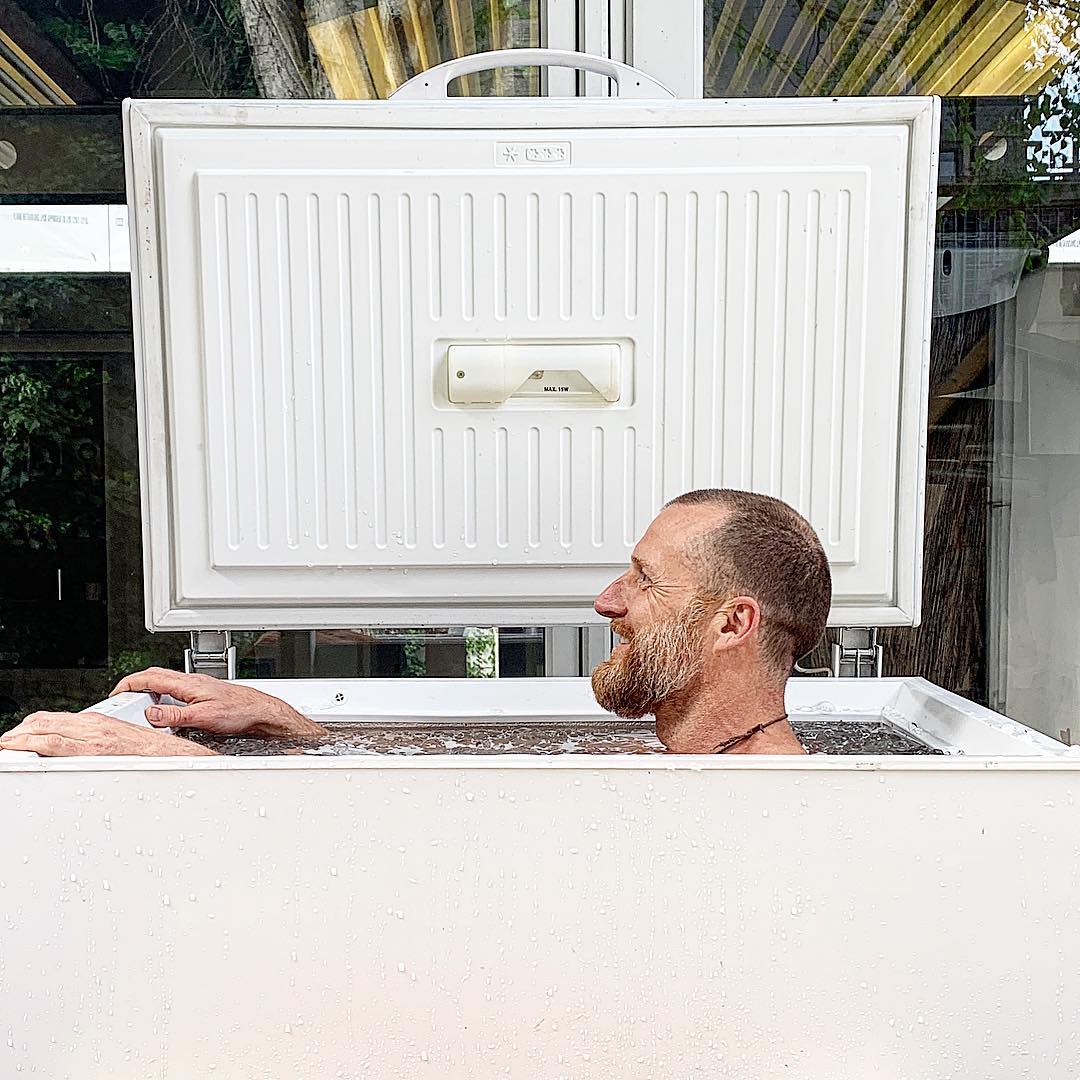
I just went out and did 11 miles of nasal breathing on really hilly terrain and when I got home I thought, “I could go out and do that again right now!” It was just one of those runs that I could easily have just gone and done it again. I wasn't hungry after that. I didn’t feel the need to eat or even drink something. I've become efficient in my breathing and running technique so my body doesn’t need to refuel as much as it would for after hours of inefficient movement. It’s incredible when you actually tune into it, what we would all be doing with these practices.
TOJ: When you committed to this barefoot running challenge, which you talk about almost nonchalantly, did you choose a goal that was one step below impossible or do you feel confident that you'll get through it?
“You can’t identify my foot with a 'socially normal' foot right now.”
Tony Riddle: I've always loved running so that's not the bit that worries me. I just see it as normal, like I should be able to wake up and just go running. It’s just 30 miles a day. The bit that worries me is the organization and logistics. What I'm looking to do is interview sustainability and environmental experts along the route. The idea is that they will run a portion of each day with me. It might be 5k, or whatever they feel comfortable doing, and then we get the mics out and talk about their specialist field within sustainability and environmental issues.
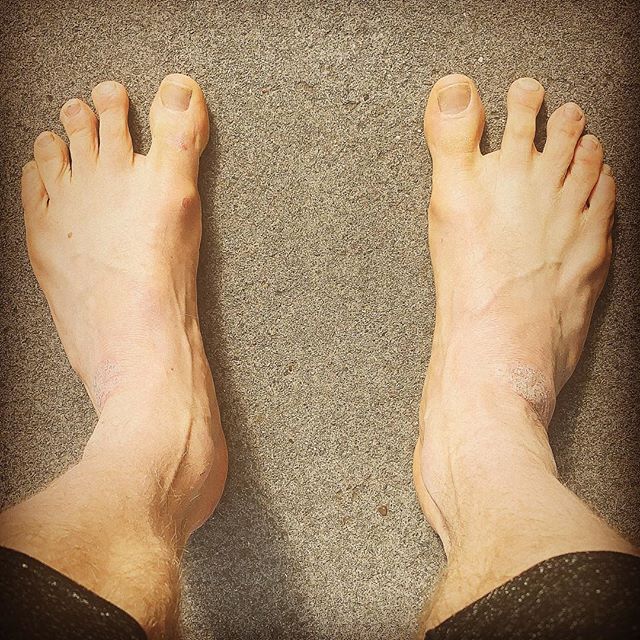
People observe running on tarmac as a problem. It’s really lovely running on tarmac. It’s the most smooth surface, perfectly engineered. And I’m so stealthy, you can’t hear my feet. You can hear a runner next to me in their rubberized, optimizing, "socially normal" running shoes and you can hear them “Bam, Bam, Bam, Bam” as they're running down the road. You don't hear that with me. I'm just picking my feet up. It's really soft. The harder the surface, the softer I have to become on the surface. So even my feet have adapted. My feet have really soft jelly pads, and they’re a bit dirty, but they’re wide, capable feet. I imagine they’re probably just about where a natural foot would be. You can’t identify them with a “socially normal” foot right now. On my barefoot running challenge, my body will adapt to the discipline, it has to, that’s physical adaptation.
As long as someone's waiting for me with an ice bath, I’ll be happy.
Visit our previous installments of the REWILD series featuring Tony Riddle's socially extreme, yet biologically normal practices.
Part 1, Tony Riddle: Introducing REWILD
Part 2, REWILD with Tony Riddle: Children and Education
Part 3, REWILD with Tony Riddle: Transforming Your Body
Part 4, REWILD with Tony Riddle: Barefoot Running Across Great Britain
To connect with Tony, visit tonyriddle.com
Facebook: @naturallifestylist
Instagram: @thenaturallifestylist
Twitter: @feedthehuman
Youtube: Tony Riddle
The Outdoor Voyage booking platform and online marketplace only lists good operators, who care for sustainability, the environment and immersive, authentic experiences. All listed prices are agreed directly with the operator, and we promise that 86% of any money spent ends up supporting the local community that you’re visiting. Click the image below to find out more.

2nd best newsletter in the universe